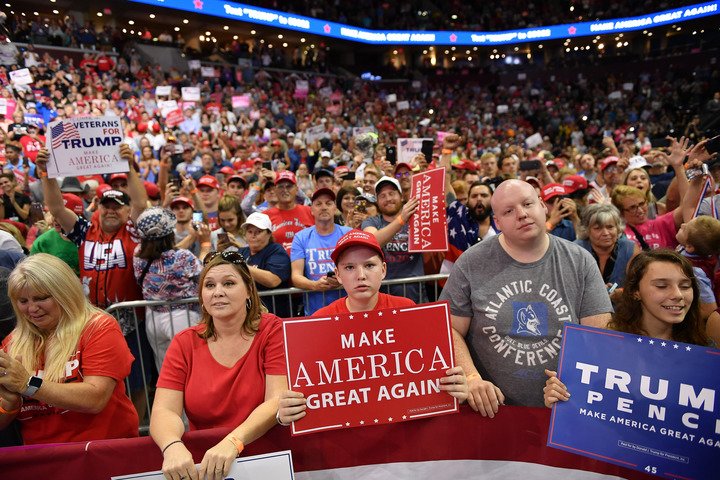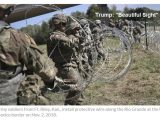
Why Trump’s Youngest Fans Still Follow Him
November 5, 2018Nine-year-old James Thaddeus’s birthday wish was about to come true.
He was going to see his hero: President Donald Trump.
“It’s two days from my birthday, so it’s like an early birthday present for me,” said Thaddeus, a fourth-grader who traveled over 100 miles with his family from Bible Grove to Columbia, Missouri, to see the president at his rally Thursday night.
Thaddeus grew up watching the TV host who would become the 45th president on the television show The Apprentice, and is most proud of Trump for lowering taxes, even though he doesn’t have to worry about paying them yet.
Thaddeus was one of the youngest Trump supporters on hand at Thursday’s Columbia rally, the first time in a decade that a US president had visited the city of 121,000, but there were plenty of teenage and twentysomething fans on hand. Though Trump’s support skews on the older side, you can find young people at his rallies. At the Columbia Regional Airport, they dotted the crowd of mostly older folks, some perched on parents’ shoulders, others with American flags pinned on their caps.
Some braved the rain, excited just to witness history. Others hoped the rally would help them make an informed decision, like 19-year-old University of Missouri sophomores Brett Williams and Ryan W. Giesing.
“We’re both conservatives, but not really by any stretch of the imagination are we big Trump supporters,” Giesing said. “I’m currently an undecided voter on the Senate race. So I want to see what pros and cons he brings to [Republican Senate candidate] Josh Hawley.”
Hawley, the current Missouri attorney general, is facing Democrat incumbent Claire McCaskill in a Senate race; the two are nearly tied in the polls. While Giesing said he supports Trump’s stance on economic issues, his biggest complaint comes with how Trump presents policies.
“He really doesn’t care about the emotions of other people, and that’s hit and miss. I mean there are some things where I can say, ‘Amen President Trump, I believe what you’re saying, but holy cow you just said that in a terrible way.’” Giesing said. “He does tend to claim to be a huge Christian, and his character would prove otherwise in some instances. That’s difficult to see as a young American—to see our country represented in that way.”
According to a March 2018 Pew Research Center poll, of millennials surveyed during Trump’s first year as president, only 27 percent approved of Trump’s job performance, while 65 percent disapproved. So the young people at this rally represented a minority view among their demographic, but they also had a variety of opinions on why they backed the president.
Some, like 17-year-old Michael Brown said they supported Trump because of his stance on issues like immigration. Brown said his own father is an immigrant from Mexico and immigrated legally, and “we want to keep it legal.”
Austin Wolken, 11, enthusiastically agreed. “He’s building a wall. He’s keeping the Mexicans out.”
Jessica Clay, a 16-year-old from Moberly, walked proudly down the road before the rally began with an umbrella and a red “Make America Great Again” hat in tow to keep the rain away. Clay said she got comments and questions at her high school when peers and teachers found out she was attending Thursday’s rally.
“I will not step down from my beliefs,” said Clay, who came with her grandma and younger sister. She credits her family, who listens to Fox News every morning, as the foundation for her values. She has friends who hold different political views, but rather than shying away from the sometimes awkward conversations that arise, she takes them head-on.
Awkwardness between friends on opposite sides of the aisle is likely to increase. According to an October 2017 Pew Research Center study, the gap between Republicans and Democrats has widened: On average, there was a 36-point difference between Republicans and Democrats on ten questions about political values. In 1994, that gap was only 15 points.
“I do argue with them. But what’s important when you argue is not to yell at them and tell them that they’re wrong. Come back with stats and evidence,” she said. “Tell yourself that it’s OK for them to believe what they want. And it’s OK for you to believe what you want.”
Clay knows classmates talk about her and her anti-abortion views. “I don’t want to stand down, but I still get nervous, because people look at me differently. They judge me differently. And I think that’s one of the reasons younger people don’t want to vote,” Clay said.
Young people don’t usually turn out for midterm elections like the ones coming on Tuesday, which are generally given less attention and hype than presidential contests. But there is evidence 2018 might be different, with early voting among under-30 voters spiking in key states and a Harvard poll finding that 40 percent of young people planned to vote, which would represent a twofold increase from the notably low-turnout 2014 midterms.
“If you want your children to have a country, vote Republican,” Trump said in his speech.
But Giesing thinks young people should do their research before they make that decision. “They’re just uninformed, and that’s sad. We have people who don’t really understand what the Constitution is, what it does,” he said of some of his peers. “What good are you doing to your country if you’re just voting for a party? If you’re just voting for a face?”
Anthony Welch, 17, may be too young to vote, but he thinks everyone who has the right to should.
“It bothers me that a lot of people have fought for that right to vote, and you’re just going to discard it as ‘I don’t really feel like it,’ or ’It doesn’t matter,’” Welch said. “It mattered enough to somebody to fight for it, so I think it should matter to you too.”
Other underage attendees also stressed the importance of being politically active, like Brock Freeman, a 16-year-old Democrat who came alone to the rally.
“It’s makes me uncomfortable to say that out loud,” Freeman said, looking over his shoulder as he announced his political affiliation. But he felt he needed to brave the feeling of being an outsider and be on the front lines at a Trump rally.
“I hope that more people do get involved, because I think it’s very interesting. Not a lot of people around the world have the same rights as we do and can participate in things like this as we can,” Freeman said. “Democracy only works when people participate.”
With his sweatshirt hood up, Freeman walked toward the hangar to hear the president berate his party.
Tessa Weinberg is a student at the Missouri School of Journalism.


